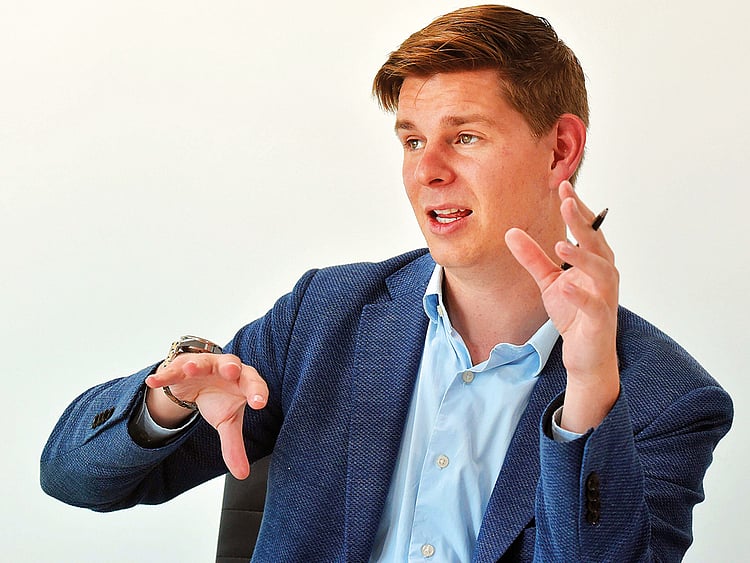Virgin Hyperloop One stresses plans to connect GCC
Company denies reports it axed plans in Saudi Arabia

Dubai: Virgin Hyperloop One says part of its mission is to connect the GCC — and that includes Saudi Arabia.
Ryan Kelly, head of marketing and communications for Virgin Hyperloop, stressed that the company plans to build a hyperloop transportation system in the region, and denied media reports that the firm had cancelled a $1 billion contract to build a hyperloop in Saudi Arabia because of the murder of Washington Post journalist Jamal Khashoggi.
“It’s always been our vision and continues to be our vision to connect the GCC, and that includes Saudi Arabia. There was a report that came out that there was a $1 billion contract cancelled — that’s incorrect, it’s false. We are a technology company. We believe that connecting people across borders expands opportunities. We try to stay out of the politics of things,” Kelly told Gulf News in an interview.
A media report in mid-October said that Virgin Hyperloop cancelled plans in Saudi Arabia as Virgin Founder Richard Branson said he would freeze ties with the kingdom until more details are disclosed about Khashoggi’s disappearance.
Branson was also serving as chairman of Virgin Hyperloop at the time, but stepped down from the position in early November and was replaced by Sultan Bin Sulayem, group chairman of chief executive officer of Dubai-based DP World.
Kelly said that Branson is still “very involved” in Hyperloop, which still operates under the Virgin brand. He added that Bin Sulayem’s appointment signals a new phase for the company as it starts to drill down into commercialisation. DP World is one of the largest investors in Virgin Hyperloop.
First hyperloop
With a new chairman at the helm, Virgin Hyperloop is ramping up its commercial plans to launch its first hyperloop, which Kelly said will be launched in less than 10 years, most likely after 2026. Hyperloop is a mode of transport resembling a train or a metro but moving at a speed of over 1,000 kilometres per hour.
“We would like to get something up and running by the mid-2020s, but we also want to be pragmatic about this; there’s a lot of work to be done at this point,” he said.
The first of its hyperloop systems is expected to be in India, but the company has also been working with the UAE’s Roads and Transport Authority (RTA) about potentially building a hyperloop connecting Dubai to other cities in the GCC.
Kelly said the California-based firm has already conducted feasibility studies for a hyperloop in Dubai, and is currently looking at options for city connectivity.
A decision on whether to connect Dubai’s two airports with a hyperloop system or whether to connect Dubai to Abu Dhabi or other cities in the region will depend on the cost versus economic benefits of each. A trip between Dubai and Abu Dhabi would take about 12 minutes on a hyperloop.
“Right now, our focus has been on the feasibility of it — figuring out the public-private partnership that we want to move forward with. We have looked at the regulatory space, and now, there needs to be a decision made at the federal level along with us about what the timing looks like,” Kelly said.
He added that Virgin Hyperloop is looking at a public-private partnership model to provide funding for a hyperloop in Dubai, and that the company still needs to form a consortium.
The company’s first hyperloop is likely to be connecting the Indian cities of Mumbai and Pune. Commuting from one of the cities to the other takes about 3.5 to four hours by car, but a hyperloop would shrink that to 22 minutes, Kelly said.
“Right now, from a progress perspective, we have an intent-to-build agreement with India. That’s not to say that they will be the first to do it. Even though right now their progress is the furthest, who knows what will happen in the GCC region?” he said.
For its internal operations, Virgin Hyperloop is preparing to raise a series C funding round in 2019, having earlier raised over $300 million from international investors that include DP World, Virgin, and venture capitals.
Affordable mass transportation
Asked about fares for passengers, Kelly said a hyperloop transportation system would have to be affordable for frequent use, and will “definitely” be cheaper than an aeroplane ticket.
“It’s pretty clear that if we’re going to be a mass transportation system but we’re not affordable, then it’s not going to be profitable,” he said.
“What I can tell you in the UAE is it’s going to be closer to a mass transportation that you can potentially take every day, so it’s got to be at a ticket price where there can be better frequency and it can’t be hundreds of dollars per ride.”
Sign up for the Daily Briefing
Get the latest news and updates straight to your inbox
Network Links
GN StoreDownload our app
© Al Nisr Publishing LLC 2026. All rights reserved.